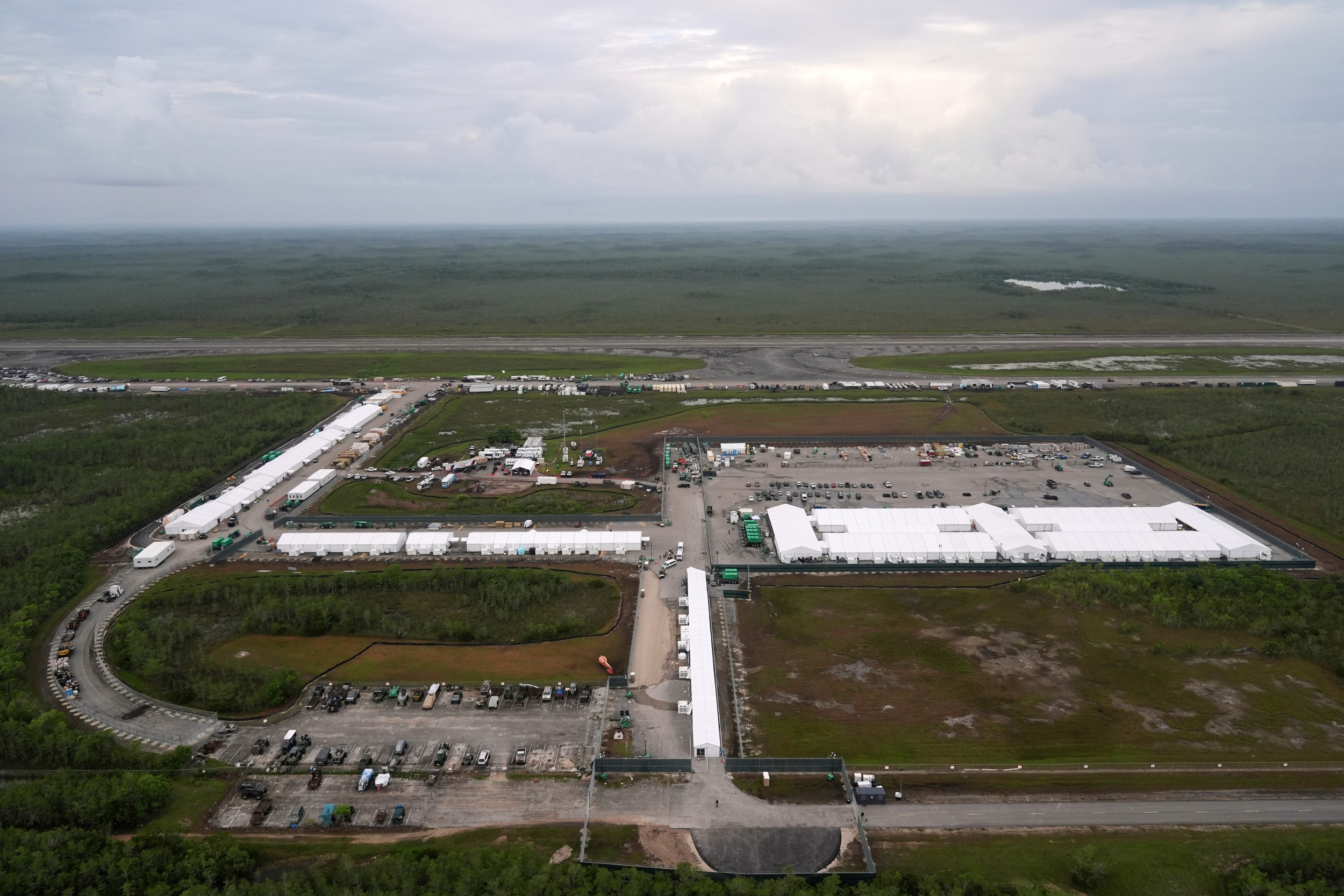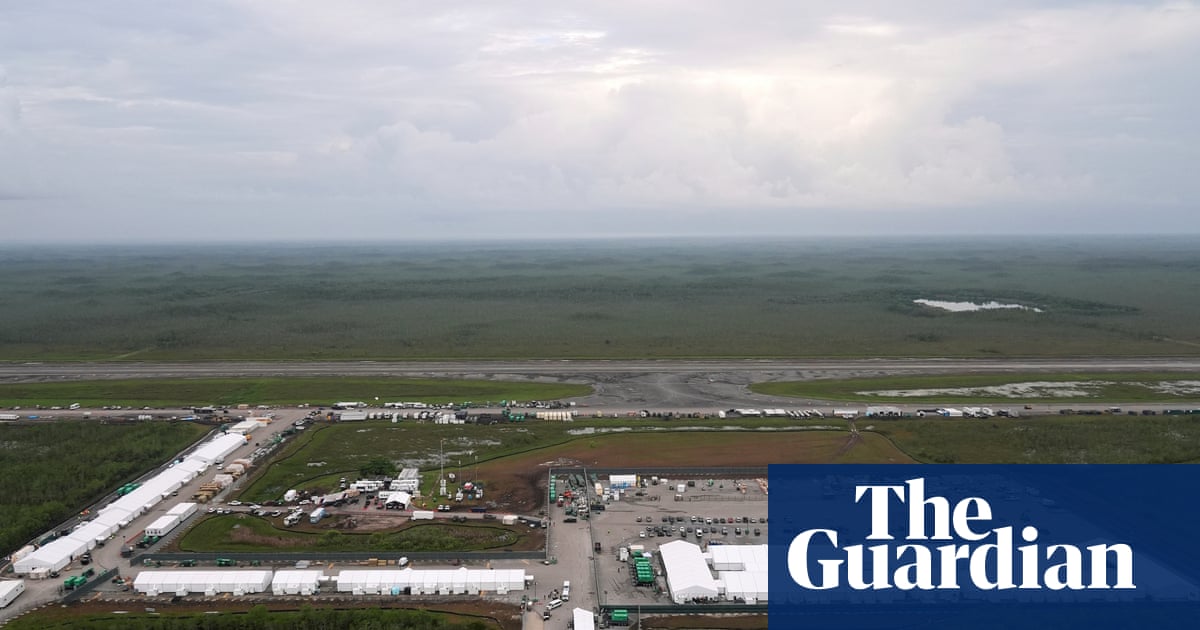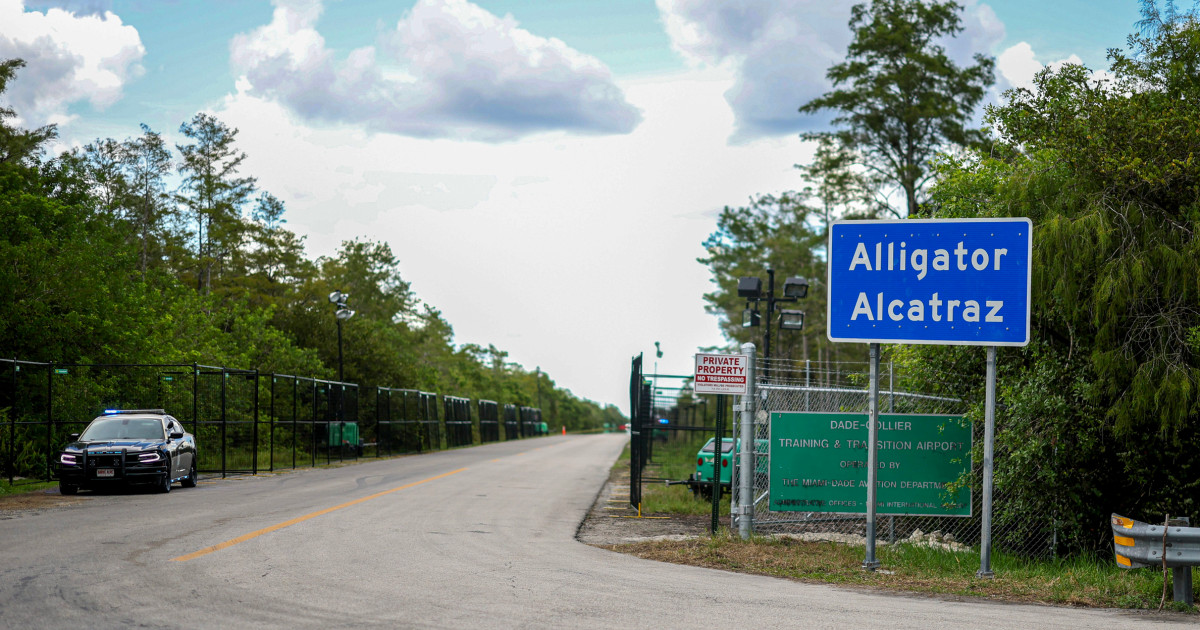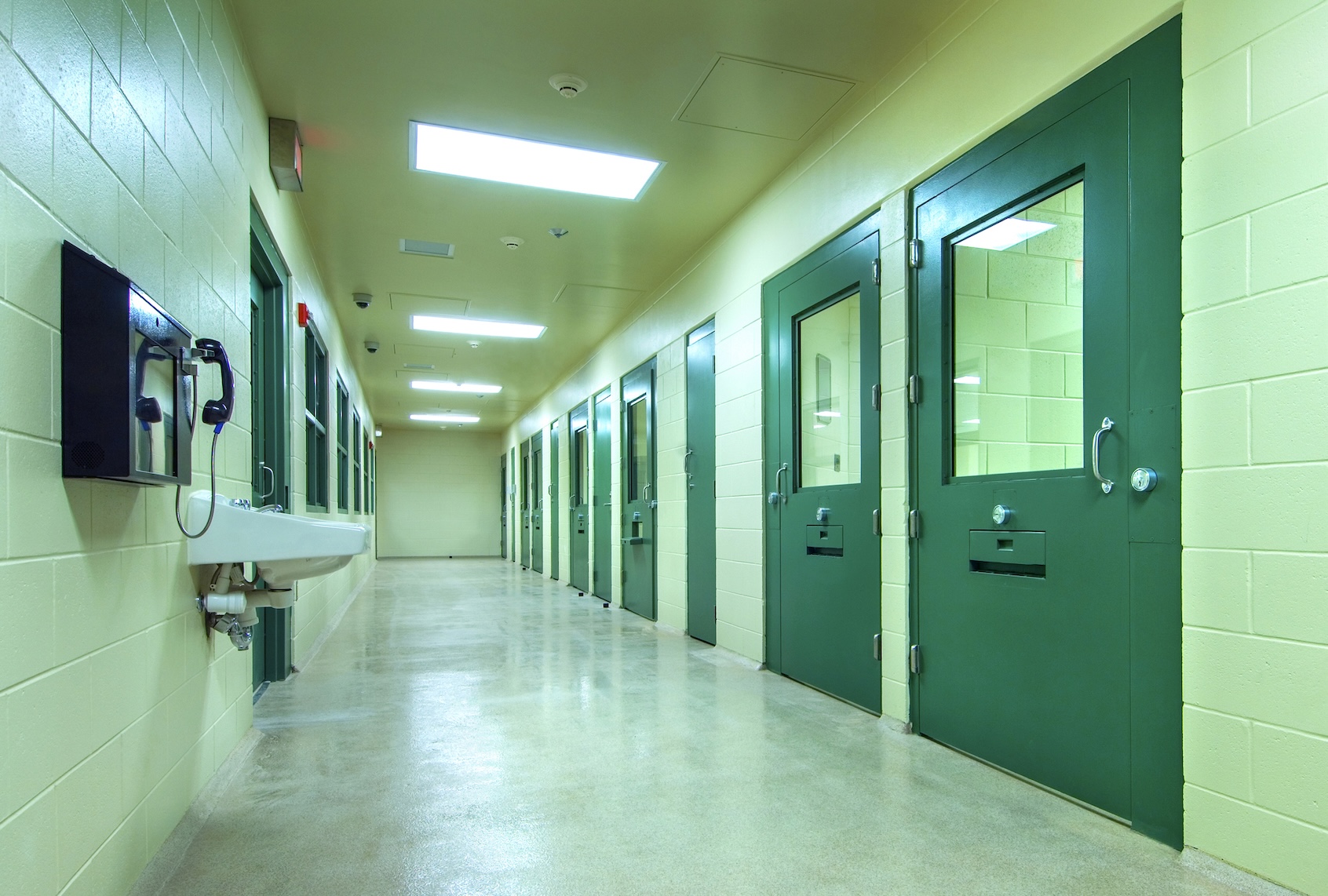In the weeks since Alligator Alcatraz opened deep within the Everglades in southern Florida, there have been mounting reports of the horrific conditions inside: Maggots in the food, sewage overflowing near beds, people having to remove fecal matter from the toilets with their bare hands due to a lack of water. To protest the conditions, detainees have launched a hunger strike, which likely continues, despite the Department of Homeland Security’s attempts to deny and suppress information about it.
Construction at Alligator Alcatraz could be halted indefinitely in the wake of a lawsuit filed by environmental groups and an Indigenous tribe arguing the detention center’s development on protected wetlands violates environmental laws. Another suit brought by the ACLU claims detainees’ constitutional rights are being violated. Florida seems undeterred. The state is planning to build a second detention center at a correctional institution that was shuttered in 2021 after numerous reports of excessive violence and abuse of inmates by guards. Florida Gov. Ron DeSantis is calling the facility “the deportation depot.”
This scary reality is snowballing in its brutality as President Donald Trump and his administration, Republican politicians and large swaths of the American population continue to broaden the cultural profile of who we deem dangerous enough to lock up. Several states are developing similar concentration camps, including one at Fort Bliss in El Paso, Texas, and an Indiana facility dubbed “The Speedway Slammer.” I’m not surprised.
I’m also not surprised that Florida is leading the way in building these facilities. The U.S. has the largest incarcerated population in the world, and Florida locks up a higher percentage of its people than any independent democratic country on earth. To date, no other state has spent as much effort collaborating with Immigration and Customs Enforcement (ICE) during the second Trump administration. Following DeSantis’ special session on immigration in January, the Sunshine State passed laws requiring local jurisdictions to enter into agreements with ICE and offering a $1,000 bonus to local officers participating in ICE raids and operations. Immigration detention in Florida quadrupled in less than six months. As the state runs out of space, Florida jails are being used to house detainees, exacerbating overcrowded conditions and forcing people to sleep on the floor. When ICE staff opposed the plans to use Florida jails as ICE detention facilities because it would violate current federal regulations and standards, a local sheriff dismissed the claims, calling them “woke.”
Prisoners in the Florida Department of Corrections system are often held under many of the same inhumane conditions present at Alligator Alcatraz. My uncle is one of them.
I’ve visited him in facilities up and down the state: In detention centers; maximum security units; psych wards; private correctional institutions; facilities with barbed wire fences, search dogs and rooftops decorated with armed guards; places in towns so small the only store for miles is a Piggly Wiggly.
I don’t pretend that many of Florida’s prisoners are not guilty of the crimes they’ve been charged with, and I won’t downplay the severity of the crimes committed — my uncle’s included. Unlike the detainees held in Alligator Alcatraz, they have ostensibly been given due process, though we could argue about the justice system’s version of the right that is often applied to Black, brown and poor people. Regardless of the circumstances, however, I believe every person deserves to be treated with dignity and humanity. I don’t believe that violence and cruelty has ever nudged anyone toward a better version of themselves.
One Wednesday in May, I woke up to frantic voicemails from my mom. My uncle had been stabbed multiple times, and she wasn’t sure if he was alive or dead. It had happened two days earlier, but she’d just found out that morning from a fellow prisoner’s girlfriend. Details were spotty. My uncle was an inmate at Dade Correctional Institution, a facility in south Miami deemed the “deadliest in Florida” by the Miami Herald following an investigation into a record number of inmate deaths in 2017. An earlier investigation into the facility revealed that officers had made “sport” of tormenting mentally ill inmates, including forcing inmates into a specially rigged, scalding hot shower as punishment for unruly behavior.
My uncle had been transferred to the facility from another prison a few years ago because Dade Correctional Institution has an Americans With Disabilities Act unit and he, a lifer, has gone deaf from decades of loud, echoing conditions.
Since he’s deaf, he didn’t hear the man — or men — coming up on him with the knife. Despite our many requests, the Florida Department of Corrections has not gotten him a hearing aid that doesn’t beep loudly in his ears, so he prefers to stay in his own, soundless world.
I imagined him walking into the same yard where we’ve sat for visits, thinking about how he’ll get to pet his favorite rescue dog later, the one corrections officers bring in for training. He prefers the dogs to humans, saying they’re the only redeeming thing about the place. In my mind, he was thinking about the dog when he was surrounded by the other men. He was thinking about the dog as the knife pierced his skin, plunging into the back of his neck and then into his ear. I imagined and reimagined the scene, watching him get caught by surprise, his eyes widening at the pain.
Did he fall to the ground? Call out for help? The woman who called my mom said four other inmates were also stabbed, and that corrections officers were involved, but it’s impossible to verify.
There are so many questions. Did the officers provide the knife? Join in on the stabbing? Simply look the other way?
My mom and siblings and I called and emailed each of the prison’s classification officers, coordinators and wardens. This was not the first time in my uncle’s 30-year incarceration that we’ve had to hound the Florida Department of Corrections for answers about his well-being. It was not the first time we’ve received calls from another inmate’s girlfriend or relative about my uncle. There was the time, a few years ago at another facility, when he was taken to the medical unit for lesions in his stomach. He was kept on a gurney in a hallway for days without treatment. He was in so much pain he thought he might die, so he had a friend get in touch with us to let us know.
Then, like now, we called and tried to get information from the staff and were given the run around. The person with answers was always on break. The warden was never available. We were treated like nuisances for caring. They informed me I was not on “the list” to receive information, a bold-faced lie. I pleaded with anyone I could get on the line. They gave me one-word answers and told me to calm down in an almost bored tone. I cried, begging them to have some compassion, to imagine it was their loved one who was hurt.
I canceled a few work calls. Without thinking much about it, I texted my co-worker and told her my uncle was stabbed. She expressed alarm and concern. I kept calling, relaying information to my mom and siblings. I reached out to the media, including the writer who investigated Dade Correctional Institution years ago. She recommended that I request copies of my uncle’s inmate file, which is public record, and any incident reports involving his name. I did this and got nothing. I tried again — still, nothing. Unfortunately, none of this was newsworthy, and my sources inside were not considered credible, so the reporters I spoke with didn’t have much to go on. I reached out to an advocacy group and received a reply three months later stating that, due to a lack of resources and too much demand, they could not help me.
A coordinator at the prison eventually told us my uncle was alive, that he had received medical treatment and was being held in solitary confinement for his safety. We were given nothing else. When I asked why we weren’t notified of the incident, I was told that it’s the inmate’s responsibility to notify loved ones — as if he could call us after being stabbed multiple times, and while he was in solitary confinement with a disability that makes it difficult to communicate by phone.
Several weeks later, my uncle was transferred to another facility at the opposite end of the state. He had 28-day-old sutures he contemplated removing himself because they itched so badly. My fury was exhausting. My family and I stopped talking about the incident and went back to business as usual, putting money on his commissary, sending him books and figuring out how to get messages to him via the new facility’s byzantine communications systems. I dropped any hope of trying to get information about what happened, even from my uncle, who, speaking on a recorded line, just said, “Shit happens in here.” The upside, for him: At least the new facility has air conditioning.
The Eighth Amendment to the Constitution prohibits cruel and unusual punishment, including the denial of necessary medical care for inmates. But thanks to the Prison Litigation Reform Act of 1996, it’s incredibly challenging for inmates to bring suits against this treatment, and just about 1% of all cases actually win. One ongoing lawsuit against Dade Correctional Institution concerns the lack of air conditioning that led to four inmates dying last year in Miami, where heat indexes can rise up to 115 degrees Fahrenheit. The Florida Department of Corrections sought to dismiss the lawsuit, arguing that the deaths were not caused by heat, but a federal judge allowed the lawsuit to proceed. The majority of Florida’s prison housing units are not air-conditioned.
I imagine the detainees in Alligator Alcatraz without adequate shelter or air conditioning in the middle of hurricane season in a South Florida swamp. I think of the cavalier way Republican lawmakers have denied claims about the detention camp’s conditions. I think of Isidro Perez, the 75-year-old Cuban man who died in ICE custody at the Krome Detention Center in Miami in July. I think of the elderly prisoner in a wheelchair who begged for help in the heat at Dade Correctional Institution and died after being refused medical attention. I think of all the lives we have lost to the normalization of cruel punishment, and how many more there are to lose.
Over the last 50 years, our bureaucratic desensitization to incarceration has grown largely unchecked. Prisons are built quietly, out of sight from the public. Visiting my uncle, regardless of where he is, requires a long drive, countless forms and hours waiting, adherence to seemingly arbitrary rules that differ from place to place and can change at any moment without notice. The point is isolation, to forget about these people. To systematically dehumanize them — first prisoners, then immigrants — and to watch as the public starts to believe they don’t deserve to be treated like humans.







